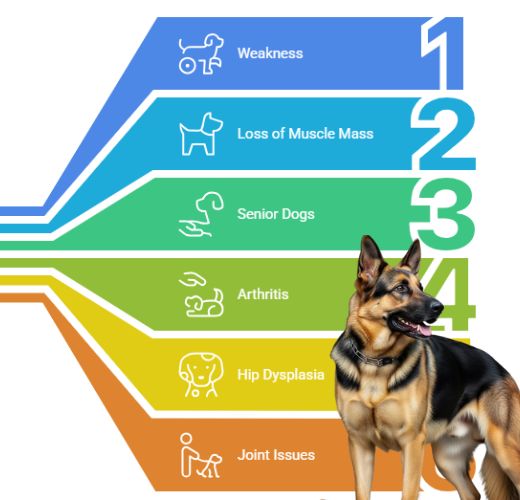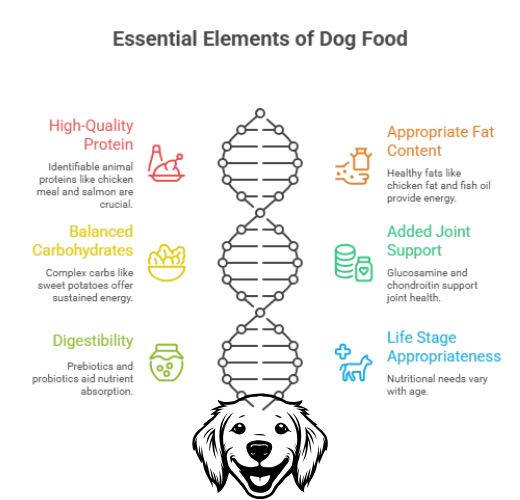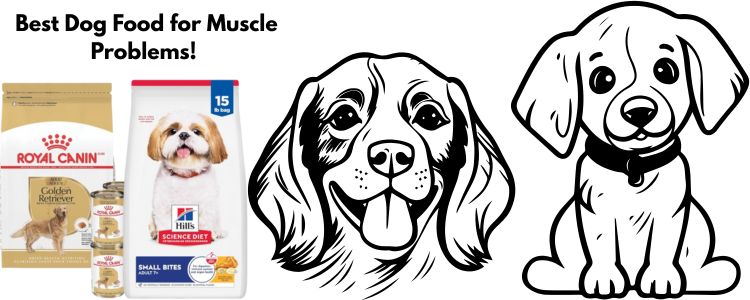Does your furry friend struggle to jump on the couch? Do their hind legs seem weaker than before? Muscle problems can significantly impact a dog’s quality of life. Watching your once-active companion lose strength is heartbreaking. Many factors contribute to muscle loss in dogs. Age, injury, and underlying health conditions all play a role. The good news is that proper nutrition makes a huge difference. You can help your dog regain strength and vitality. Choosing the best dog food for dogs with muscle problems becomes crucial. This guide explores everything you need to know.
Understanding Canine Muscle Problems
Muscle problems in dogs often show as weakness or loss of muscle mass. Vets call this muscle atrophy. It happens when muscle fibers shrink or waste away. This condition can affect any dog. Senior dogs are particularly susceptible. Arthritis, hip dysplasia, and other joint issues often lead to disuse atrophy. Dogs avoid using painful limbs. This causes muscles to weaken over time.

Says Russ Kelley of Eukanuba’s Pet Health & Nutrition Center.
“Muscle tissue is a great example of how so many different nutrients are needed for a dog to optimally function, One class of nutrients is not more important than another. They are all important in that they work together for our dogs to perform at an optimal level.”
Other causes include neurological conditions, hormonal imbalances, or even some medications. For instance, prolonged use of corticosteroids can lead to muscle wasting. A proper diagnosis from your veterinarian is always the first step. They identify the root cause of your dog’s muscle issues. This helps you develop a targeted treatment plan. This plan should include dietary adjustments.
Key Nutrients for Muscle Health
Nutrition forms the bedrock of muscle repair and growth. Dogs with muscle problems need a diet rich in specific nutrients. These nutrients support muscle protein synthesis. They also reduce inflammation and provide energy.
Protein: The Building Block of Muscle
Protein is paramount. Muscles are made of protein. High-quality animal protein provides essential amino acids. Dogs cannot produce these amino acids themselves. They must get them from their diet.
States Dr. John Wakshlag, a professor at Cornell University College of Veterinary Medicine.
“If the dog is losing lean body mass then a diet higher in protein may be necessary, Protein is necessary to build and maintain muscles.”
Look for dog foods with named meat sources. Chicken, beef, lamb, and fish are excellent choices. Aim for at least 25-30% protein content on a dry matter basis. This supports muscle growth and maintenance. Lower protein diets often lack the amino acids needed. A 2011 study published in the Journal of Animal Science found that increasing dietary protein in senior dogs helped maintain lean body mass.
Essential Fatty Acids: Reducing Inflammation
Omega-3 fatty acids are vital. EPA and DHA, found in fish oil, have strong anti-inflammatory properties. Inflammation can hinder muscle recovery. It also causes pain. Dogs with muscle problems often suffer from joint pain. Omega-3s help alleviate this.
Fish oil supplements are also an option. Dr. John Loftus, also from Cornell University, recommends 1-2 capsules of a 1,000 mg fish-oil supplement (containing about 300 mg of EPA/DHA) per 10 pounds of body weight daily for dogs with arthritis. This can significantly improve lameness. Flaxseed oil also provides omega-3s.
Glucosamine and Chondroitin: Joint Support
These compounds are not direct muscle builders. However, they are crucial for joint health. Healthy joints allow for better mobility. Improved mobility encourages muscle use. This prevents further muscle loss. Glucosamine helps repair cartilage. Chondroitin prevents its breakdown. Many dog foods formulated for senior dogs or joint health include these.
L-Carnitine: Fat Metabolism and Muscle Support
L-Carnitine helps the body use fat for energy. This spares protein for muscle building. It also supports muscle growth directly. Some specialized dog foods include L-Carnitine. This is especially true for performance or senior formulas.
Vitamins and Minerals: The Supporting Cast
Vitamins and minerals play supportive roles.
- Vitamin E and C: These are antioxidants. They fight oxidative stress. Oxidative stress damages muscle cells.
- B Vitamins: These are essential for energy metabolism. Muscles need energy to function and repair.
- Calcium and Phosphorus: These minerals are critical for bone health. Strong bones provide a stable framework for muscles.
- Magnesium and Potassium: These support proper muscle function. They are important for nerve impulse transmission to muscles.
Choosing the Best Dog Food: What to Look For
Selecting the right dog food requires careful consideration. Do not just pick the first “muscle support” bag you see.

High-Quality Protein Sources
Always check the ingredient list. The first few ingredients should be identifiable animal proteins. Think “chicken meal,” “deboned lamb,” or “salmon.” Avoid foods with vague terms like “meat by-products.” These often contain lower quality protein.
Appropriate Fat Content
Fat provides concentrated energy. It helps dogs maintain a healthy weight. This is important for muscle health. Too much fat, however, can lead to obesity. Obesity puts extra strain on joints. Look for healthy fat sources. Chicken fat, fish oil, and flaxseed are good examples.
Balanced Carbohydrates
Carbohydrates provide energy for daily activities. Complex carbohydrates are best. Sweet potatoes, brown rice, and oats offer sustained energy. Avoid excessive simple carbohydrates. They can lead to energy spikes and crashes.
Added Joint Support
Many dog foods designed for muscle and joint health include glucosamine and chondroitin. This is a beneficial addition. Some foods also include MSM. MSM is another compound that supports joint health.
Digestibility
A highly digestible food ensures your dog absorbs nutrients efficiently. Ingredients like prebiotics and probiotics can aid digestion. Look for foods that cause minimal digestive upset.
Life Stage Appropriateness
Puppies, adult dogs, and senior dogs have different nutritional needs. A growing puppy needs more protein for rapid muscle development. Senior dogs often need more protein to counteract age-related muscle loss. They might also need fewer calories due to decreased activity.
Veterinary Recommended Brands
Several reputable brands offer specialized diets. These are often developed with veterinary nutritionists.
- Hill’s Science Diet: Offers formulas for various life stages and health conditions, including joint support.
- Royal Canin: Known for breed-specific formulas and veterinary prescription diets. Some formulas target mobility.
- Purina Pro Plan: Provides performance-oriented diets with higher protein. They also have senior-specific options.
- Orijen: Features high animal protein content. Their “WholePrey” philosophy includes organs and bones for complete nutrition.
- Wellness Core: Focuses on natural, protein-rich, grain-free options. Many include probiotics and omega fatty acids.
Always discuss specific brand choices with your vet. They provide personalized recommendations. Your vet considers your dog’s unique health profile.
Beyond Food: Holistic Muscle Support
Diet is a major part of the solution. Other elements are equally important.
Controlled Exercise and Physical Therapy
Gentle, consistent exercise strengthens muscles. Avoid over-exercising. Too much stress can break down muscle. Short, frequent walks are often better than long, strenuous ones.
Swimming offers excellent, low-impact exercise. It builds muscle without stressing joints. Hydrotherapy pools with trained therapists are available in some areas. Physical therapy helps re-engage weakened muscles. A certified canine rehabilitation therapist can create a custom exercise plan. This might include balance exercises or resistance training.
(Note: Replace “your_video_id” with a relevant YouTube video ID on canine physical therapy or muscle-building exercises for dogs.)
Supplements
Supplements can complement a good diet.
- Fish Oil: Provides omega-3s.
- Glucosamine/Chondroitin: Directly supports joint health.
- Creatine: A natural compound. It helps muscles produce energy. Discuss creatine supplementation with your vet.
- MCT Oil: Medium-chain triglycerides. They offer an easily digestible energy source. They can be beneficial for senior dogs.
Do not give supplements without veterinary guidance. Some supplements can interact with medications. Others may be unnecessary or harmful in large doses.
Weight Management
Maintaining a healthy weight is vital. Excess weight puts immense strain on joints. This exacerbates muscle problems. Work with your vet to achieve an ideal body condition score.
Regular Veterinary Check-ups
Routine vet visits are critical. Your vet monitors your dog’s progress. They adjust the treatment plan as needed. Early detection of muscle issues leads to better outcomes.
Statistics on Canine Muscle Problems
Muscle problems, particularly muscle atrophy, are common. A study published in Frontiers in Veterinary Science (2025) found a high prevalence of myofascial trigger points (MTPs) in dogs with osteoarthritis. Thirty out of 35 dogs (86%) in their sample had at least one MTP. These trigger points are often associated with muscle pain and dysfunction. The study also noted a positive correlation between age and the number of muscles affected by MTPs. This highlights the increased risk for older dogs.
Another study looking at owner-reported intervertebral disc disease (IVDD) in the AVMA Journals (2025) indicated that “epaxial muscle atrophy is more evident in large dogs with intervertebral disc disease.” This further emphasizes the link between musculoskeletal conditions and muscle loss. The lifetime prevalence of owner-reported IVDD was 1.2% in the study population of over 43,000 dogs. Overweight dogs had increased odds of IVDD, indirectly contributing to muscle issues.
Case Study: Max’s Journey to Recovery
Max, a 10-year-old Labrador Retriever, started showing signs of weakness in his hind legs. He struggled to get up. He avoided stairs. His owner, Sarah, noticed his thigh muscles seemed smaller. A trip to the vet confirmed mild hip dysplasia and significant muscle atrophy.
Max’s vet recommended a multi-pronged approach. First, they switched Max to a prescription joint-support diet. This food had higher protein. It also contained glucosamine and chondroitin. Sarah started adding a fish oil supplement to his meals.
Second, they began gentle physical therapy. This included short, controlled walks. They also started hydrotherapy sessions once a week. Sarah learned how to perform gentle massage and passive range of motion exercises at home.
After three months, Max showed remarkable improvement. He jumped on the couch again. He navigated stairs with more ease. His muscle mass visibly increased. This turnaround was largely due to the tailored diet and consistent physical therapy. Sarah’s dedication to his recovery made a world of difference.
Frequently Asked Questions (FAQ)
Q1: What are the first signs of muscle problems in dogs?
A1: You might notice your dog having trouble getting up or lying down. They may limp or seem weaker on one side. Their hind legs might look thinner. Decreased energy levels or reluctance to play are also signs.
Q2: Can dog food alone fix severe muscle atrophy?
A2: Dog food is a crucial part of the solution. It cannot fix severe atrophy alone. A holistic approach is best. This includes veterinary care, physical therapy, and appropriate exercise.
Q3: How long does it take to see improvements after changing dog food?
A3: Improvements vary. Some dogs show changes in a few weeks. Others might take months. Consistency is key. Follow your vet’s recommendations closely.
Q4: Are grain-free diets better for muscle issues?
A4: Grain-free diets are not inherently better for muscle problems. Some dogs have grain sensitivities. For most dogs, grain-inclusive diets provide balanced nutrition. The focus should be on high-quality protein and essential nutrients.
Q5: Should I give my dog human muscle-building supplements?
A5: Absolutely not. Human supplements can be toxic to dogs. Always use supplements specifically formulated for dogs. Always consult your veterinarian before giving any new supplement.
Bottom Line
Addressing muscle problems in dogs requires patience and a comprehensive strategy. The best dog food for dogs with muscle problems provides the essential nutrients needed for repair and growth. Remember, protein is paramount. Omega-3 fatty acids and joint-supporting compounds are also incredibly helpful. Beyond diet, consider controlled exercise, physical therapy, and appropriate supplements. Always partner with your veterinarian. They guide you in making the best choices for your beloved companion. With the right approach, your dog can regain strength. They can enjoy a more active, comfortable life. Your dog deserves to be strong and happy.

